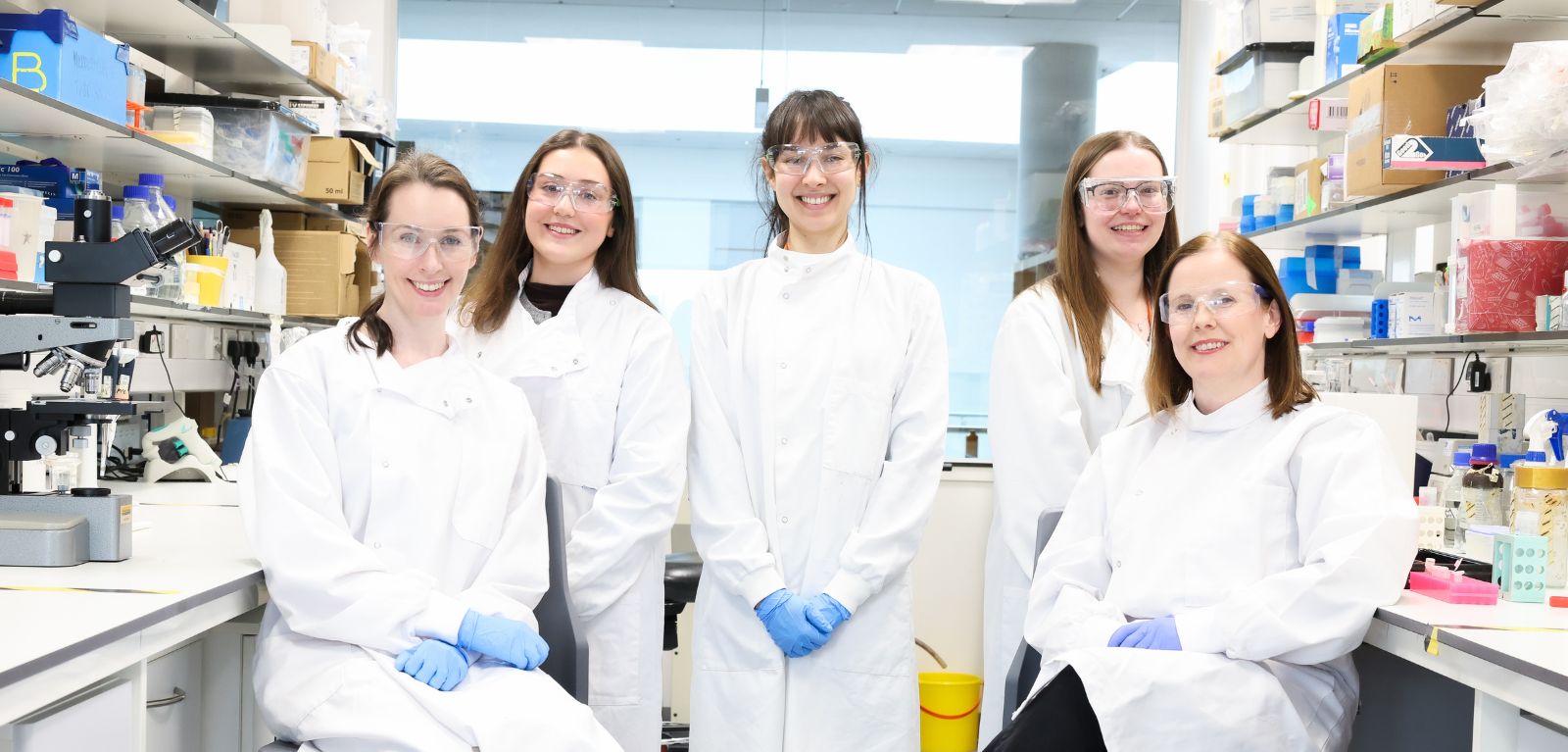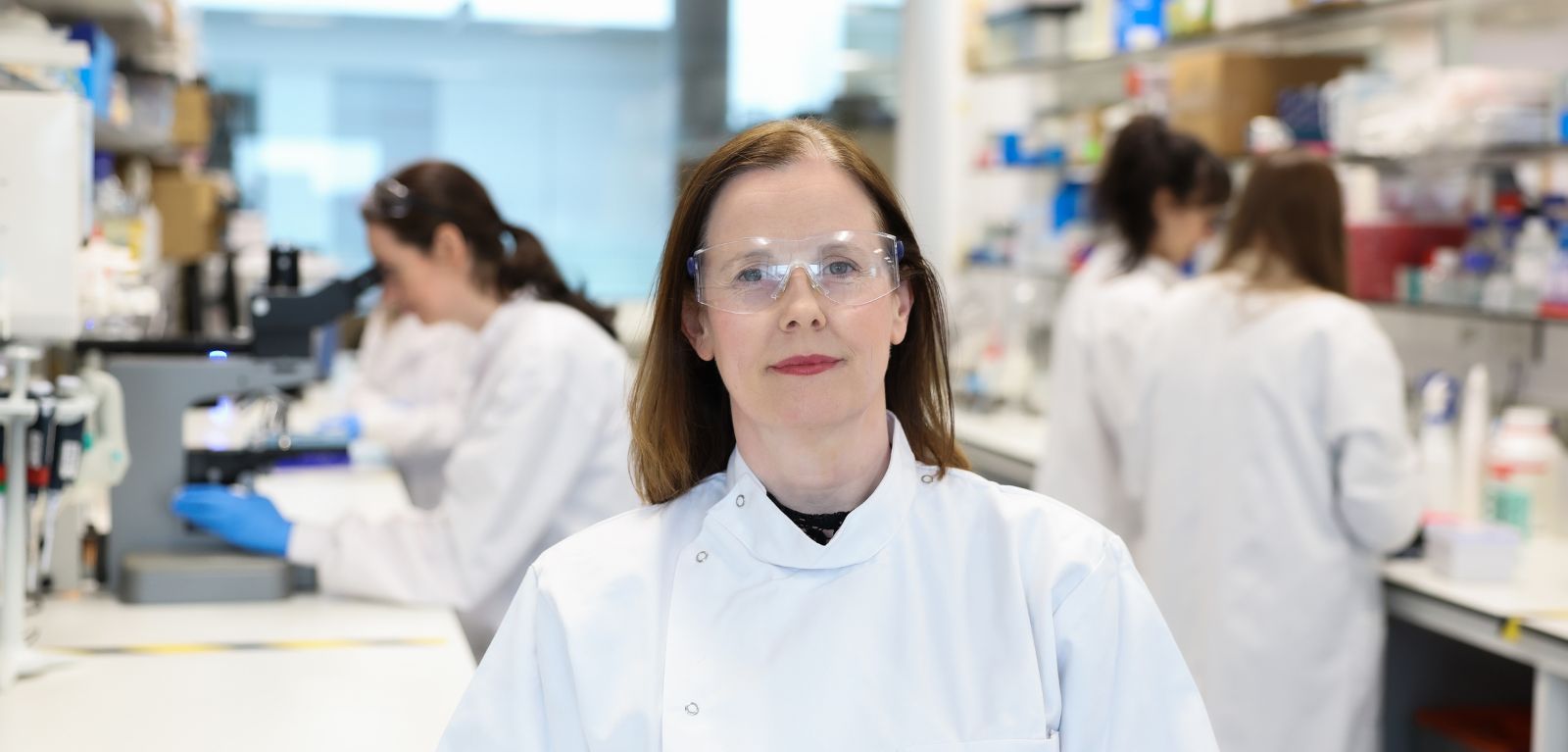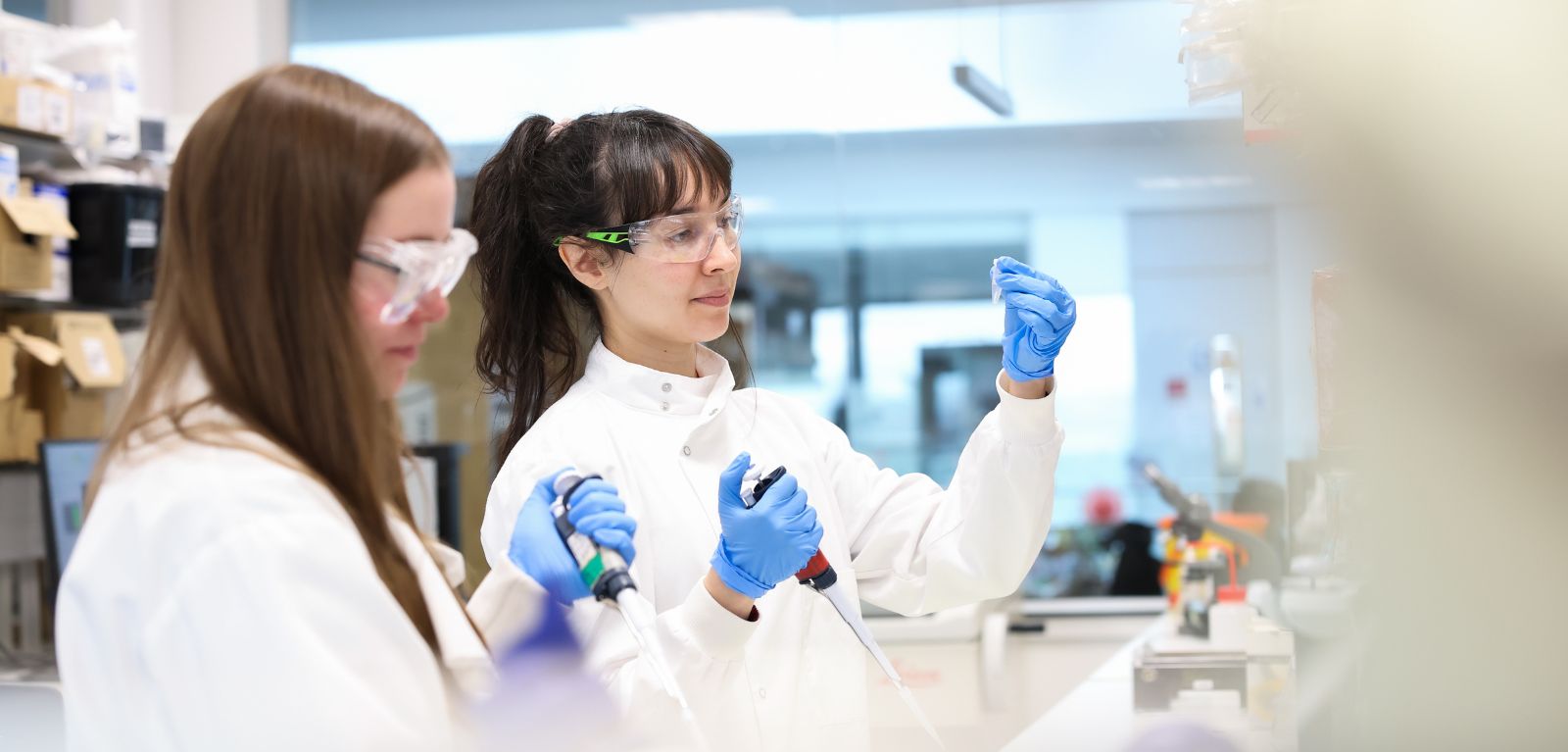Lives Behind Research
Queen’s takes great pride in delivering innovative, groundbreaking research that literally changes lives across the world. Research that changes lives doesn’t happen on its own. Funding, resources, people...behind the scenes is a spectrum of forces.

Queen’s Professor Denise Fitzgerald was diagnosed with Transverse Myelitis (TM) aged 21, an inflammatory spinal cord condition that left her paralysed.
The rapid onset of symptoms began while overseeing a trampolining competition at University College Dublin (UCD). She said:
“I had a dead leg and within the time it took me to have a shower, the other leg started getting a bit numb around the knee and two hours later, I was in St Vincent’s Hospital in Dublin, paralysed from just below the chest down.”
While the onset was swift, Denise spent some of those two hours directing traffic at the competition from the floor as she couldn’t stand. This was until a physiotherapist spotted her, worked out something was seriously wrong and called an ambulance.
Medical staff were initially baffled until neurologist Professor Michael Hutchinson arrived and told her: “I think you have a very rare condition and what’s happening is the messages can't get through from your brain to your body. That's why you can't move your legs.”
Denise was sent for an MRI: Professor Hutchinson’s diagnosis proved accurate – and he assured her it wasn’t Multiple Sclerosis (MS). The significance of this only became clear to Denise as she learned about MS, a life-long condition, in her later work. Denise remembers focusing on how quickly she could get back to trampolining as she had a competition coming up in Scotland.
But first she had to learn how to walk again. “I was ridiculously positive; I’m a ‘glass-half-full’ person”. Although unfazed, she had no real understanding that full recovery was not guaranteed.

After five weeks, they discharged Denise to recuperate at her family home in County Clare: “At that point I was on two crutches. I went from bed to wheelchair to a walking frame to crutches, then one crutch and then walking unaided. That was the pathway of learning to walk again with great support from physiotherapists especially Elizabeth Laffan at St Vincent’s Hospital, Dublin.”
THE ROAD TO RECUPERATION
After initial recuperation with physio and water therapy, it took about a year before Denise was able to walk without crutches. And while she suffered from incredible fatigue, being a young student, Denise was keen to get back to life in Dublin. She made lots of adaptations to her life to make sure she had the independence she needed and she is indebted to her PhD mentor, Prof Alan Baird, who supported her return to her PhD studies, which coincidentally was investigating inflammation: “Without Alan, put simply, I wouldn’t have become a scientist”.
Denise is clear on how fortunate she was:
“I was really lucky with my outcome and I’m always sensitive that people who have MS have a lifelong condition, and they don't see improvements in certain phases of their disease, they only see deterioration.”
Denise’s personal experience sparked a passion for research into neurological recovery. After training in Ireland, she secured a position in Philadelphia under the mentorship of Prof Abdolmohamad Rostami and Dr Bruno Gran, in the Dept. of Neurology and at Thomas Jefferson University. The role was meant to last one year; she stayed for five.
She recalls that Bruno was incredibly generous in his support: “He could have asked me to write a fellowship application on the topic he was interested in, but he said – no, you write a fellowship on the topic that’s going to get funded.”
Then a job came up in Queen’s that met with Denise’s growing ambition to focus on research. She says:
“One of things that attracted me to Queen’s was that it was a research-intensive position. A lot of other positions are more balanced towards the teaching than the research but if you're spending a lot of time teaching, you have less time for research. So, this was a path I now knew I wanted – that is, the time for research.”

Once at Queen’s, Denise took a major risk by shifting the focus of her research. "Existing drugs for MS were reducing inflammation but not repairing damage," she explains. "So, I changed direction to study how the immune system could help repair damage it had caused."
THE BREAKTHROUGH DISCOVERY
Just as funding was running low, her team made a breakthrough. They discovered that a specific type of immune cell can signal to brain stem cells to repair myelin, the protective layer around nerves that is damaged in MS.
"If we understand this process, we can use this knowledge to develop drugs to trigger repair when it fails," she says.
Denise credits the strength of the research to her team who are always looking at ways to do things differently. Dr Yvonne Dombrowski, a key research leader was instrumental in these early discoveries. She is also incredibly grateful for the “extremely generous support” from experts such as Professor Robin Franklin from University of Cambridge and the pioneering MS researcher, Professor Dame Ingrid Allen.
While Dame Ingrid is well remembered as a major global leader in her field, Denise considers her “a role model, breaking glass ceilings, one after the other.”
As she explains: “Ingrid Allen became a key person who encouraged me – I was green. I was new. I didn't really know what I was doing, and she was a great support.”
THE POWER OF LEGACY GIFTS
Ingrid’s legacy is not just in her support, drive and pioneering work for women researchers, she also left a legacy gift in her will which has enabled further MS research.
But more than that, it provided Denise’s team with a platform to think big. Collaborating with the MS Society and a Queen’s-funded PhD studentship, she brought together an expert team of leading investigators, and is creating a public consultation panel. This new collaborative team, with expertise in neurology, ophthalmology, immunology, neuroscience, regenerative biology and the lived experience of MS, have just launched the first Northern Ireland MS Research Hub at Queen’s.
The new research hub – made up of an interdisciplinary team of scientists, medical doctors, nurses, people affected by MS and students - will allow for the development of a large-scale programme of MS research in Northern Ireland.
Designed to benefit people affected by MS both locally and globally, it will involve collaboration between the research team with local and global partners, with guidance from their international expert advisory panel.
Denise says: "Without Ingrid’s gift, we could not have built up this hub which has now secured funding from the UK MS Society and the Public Health Agency. Her legacy has seeded all this activity, which will allow us to scale up to become a centre of excellence for MS research.
“For Yvonne and I and the key people leading it, to know that Ingrid actually is the person behind this is quite moving because she helped guide us as early-career researchers in person, and even now, after her passing, she is still helping us.”
Denise’s key message to others is to build up and appreciate the team around you: “I was one of those people who would have fallen through the cracks in research career development. It turns out I could be a team leader and go on to be a professor. I didn’t start out with this plan, but it was having those people guiding at the right time that made it happen. It is critical that we invest in our next generation of creative, committed researchers to help solve major health challenges of our time.”